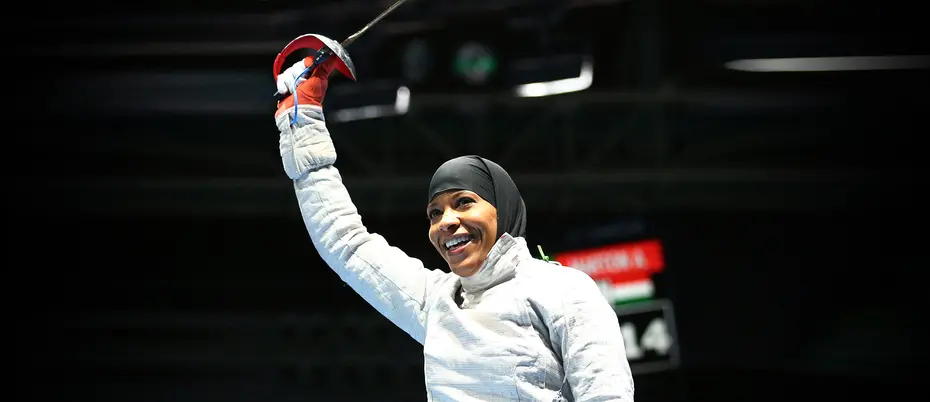How defiance and determination led to Olympic bronze for Ibtihaj Muhammad
In the ultra-competitive world of Olympic fencing, Ibtihaj Muhammad learned to stay calm, rely on herself, and make some tough choices to succeed.
Olympic sabre fencer Ibtihaj Muhammad has been labeled, categorized, and classified by others throughout her entire life — as black, a female, a Muslim. But she prefers to label herself through the attributes that have seen her clear the toughest of obstacles and emerge a champion: defiance, perseverance, and a positive outlook on life.
During the 2016 Summer Olympics in Rio de Janeiro, Brazil, Muhammad became the first female Muslim American to compete in the games wearing a hijab and the first to medal for the United States, earning a bronze medal in the team fencing event.
“People have tried to define me as being a person of color, or a girl, or being Muslim, and I’ve hated to be confined by society’s limited expectations,” Muhammad told an audience gathered for the keynote event of Sloan Women in Management’s Push 4 Parity week. “So, I’m always pushing back, and doing that you create resentment from people around you. No matter what, I’ve always tried to do everything with a smile.”
Aside from fencing, Muhammad co-founded a nonprofit organization called Athletes For Impact, which encourages athletes to push for social change. She’s also launched a clothing line aimed at bringing affordable, modest clothing to American markets, and served as the likeness for a version of Mattel’s Barbie doll that wears a hijab. In early September, she was featured in Nike’s current “Just Do It” campaign alongside former San Francisco 49ers quarterback Colin Kaepernick, and her book, “Proud: My Fight for an Unlikely American Dream” was published last month.
For Muhammad, fencing was the perfect fit because the sport’s full-body covering, including the protective mask, was consistent with her religious beliefs. But as elegant of a sport as fencing is, Muhammad said its behind-the-scenes underbelly isn’t nearly as graceful.
Composure under pressure.
When the fabric that her hijab is made of became wet from perspiration under her mask during matches, Muhammad often found herself unable to hear the cues signaling her to get ready to start. That, she said, sometimes cost her points at the whim of an official who deemed her unprepared to begin on the signal.
The experience was a lesson in operating under pressure, helping her learn to maintain her composure in those moments to avoid getting frustrated and being further penalized.
Supporting yourself.
Fencing is an individual sport before it’s a team sport, Muhammad said, and that taught her to rely on entirely herself to succeed — because she wasn’t getting much support from her fellow fencers.
When a fall during a training camp left Muhammad with a sprained ankle that she thought could have been a career-ending broken bone, it was met only with laughter from her teammates, she recalled. None of them visited her in the hospital, she said.
Shortly after, her team coach called a meeting that she expected would be used to rally the fencers before the next match. Instead she was berated for not showing up to practice despite the injury, she said.
The cost of competing.
Reaching the most elite level of fencing also required Muhammad to forego parts of her personal life and relationships. “I’ve learned that not everyone is meant to understand your journey and not everyone will trust the process. It’s such a leap of faith,” she said.
But other peoples’ doubt in her ability to succeed has always been the fuel for Muhammad’s competitive fire, she said.
“I know what it’s like to be made to feel different,” Muhammad said. “I faced a lot of alienation as a member of Team USA. I felt ostracized a lot and not included, but I think that these kind of notches on my belt are really what’s shaped me into the athlete that I am.”




